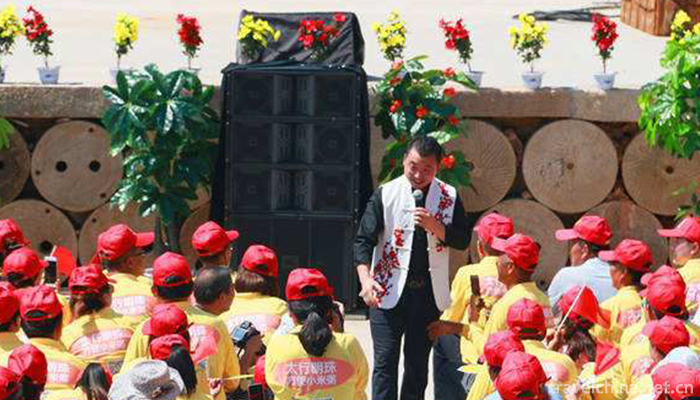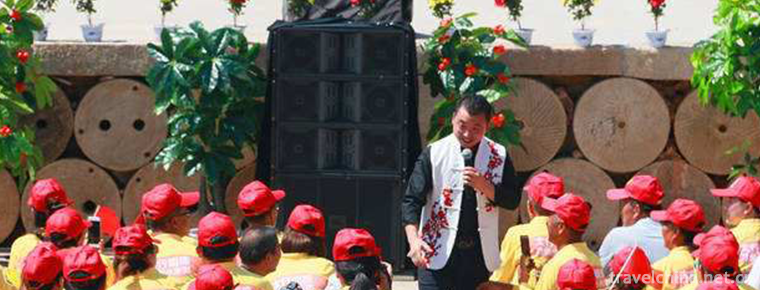Left power blossoms
Left power blossoms
Zuoquan's flowering tune is popular in the Taihang Mountains of Shanxi Province, one of the national intangible cultural heritage.
The style of Zuoquan folk songs began to take shape in Sui Dynasty. In 1930s, Zuoquan flowering tune was derived from Zuoquan folk songs. Zuo Quan's blooming tunes are exquisite in conception, novel in lyrics, and strong local color and appeal are highlighted by the lining sentences.
On May 20, 2006, Zuoquan County, Shanxi Province, declared that Zuoquan Flowering Regulation was approved by the State Council of the People's Republic of China and included in the first batch of national intangible cultural heritage list, non-legacy number II-1.
historical origin
According to Liaozhou Chronicle, Zhurong, the son of five ancient emperors, was sealed up in Liaoyang (Zuoquan County in ancient times). When people held sacrificial activities in Zhurong Temple, where ancestors worshiped Zhurong, they repeatedly chanted and prayed for their ancestors to give them light and happiness. After the county system was restored in the 10th year of Kaihuang in Sui Dynasty (590), the unique style of folk songs began to take shape, and the three forms of big tune, minor tune and miscellaneous songs were intertwined. In fact, the traces of Song Dynasty's "singing earnings" and Yuan Dynasty's "Santao" can still be found in the music board structure of Zuoquan's folk song "Daqiang". During the Ming and Qing Dynasties, folk songs have become an indispensable way of expressing people's feelings, such as Wujunshan Poetry Copy, Liaoyang Poetry Copy and so on. It is not difficult to find the historical marks in the embroidered purse, Wugeng and Banning Foreign Smoke, which are still popular today. During the Anti-Japanese War, the local people used folk songs to propagate the anti-Japanese war.
Zuoquan folk songs can be divided into three forms: major tune, miscellaneous tune and minor. Left-right flowering tune is a minor. Since the 1930s, a unique form of folk song art, blooming tune, has been derived from minor tunes. Zuo Quan's flowering tune belongs to the "folk song style". It is called flowering tune because of its exquisite and novel lyrics and its analogy with "flowering". Flowering tunes are mainly distributed in Zuoquan, Heshun, Wuxiang and Xiangyuan counties, among which Zuoquan is the best.
Cultural characteristics
form
Minor is the main part of Zuo Quan's folk songs. It belongs to the music of musical brand. It has two types: repetition of single songs and continuation of multiple songs. It is suitable for people to hum when they are engaged in more relaxed work. The tune is short and they can fill in and change the lyrics by themselves. There are more than 7 words in the lyrics. There are 10 words and 5 words between them. It can also narrate and express feelings. It has clear style, rich content and is easy. In circulation.
tone
Left-right blossom tone is concise, deep emotional people, the vast majority of them are composed of two phrases that correspond to each other. The melody is mainly composed of seven-tone scales, sometimes with big jump, which is used to express the ups and downs of emotions and emotions, greatly increasing the appeal of music.
Zuo Quan's flowering tunes are mostly love songs with concise tones, mostly consisting of two phrases that echo each other. The first phrase rises and the second phrase ends. The lyrics are mostly improvised when people work in the countryside. The first phrase borrows the metaphor of flowering, and the second phrase tells the story of love. The so-called "flower" can not only blossom, but also be used in daily life. Scissors, brooms and stones in products and articles can also blossom, such as "the door opens and blossoms, brothers come in outside the door", "the glass blossoms inside and outside, and sees my eggs'relatives far away", "yam eggs blossom and knot, and eat eggs to touch my heart and liver petals". Local dialects such as "Ah-Ah”
Connotation
From the content revealed by Zuoquan's flowering tune, we can see the real meaning of love songs. Flowers are beautiful and pleasant. Flowers blossom, which is a beautiful display, expresses the love of young women to young men. It is a pursuit of good love and longing for life and its continuity. It can be further found that in addition to the various metaphors of "flowering" full of fantasy and imagination, the dialectal linings in the flowering tone are cordial, natural, sincere, simple and pleasant. The most common line is "little relatives'eggs". A study of "little relatives' eggs" shows that "bad eggs" is the local language, meaning fruits on trees or in the fields. For example, "Yam Eggs Blossom and Bear Eggs" in "Acacia Bitter" refers to fruits. But more often, it is personified. The term "objection" refers to a lover, and the word "kiss" is added to become "objection". For example, "To wash clothes in the river with one's eggs and kneel on the rocks with both legs"; "The sparrow flies on the eaves, thinking that this one can't be seen by one's own". That is to say, since it blossoms, it is necessary to find the sweetheart's "intimate eggs", which is the fruit of love. It can also be said that the effect of using dialectal singing linings in flowering tunes can not be replaced by any substantive words, but also enhance artistic expression and appeal, and highlight the charm of love songs.
Representative Works
The representative songs of Zuo Quan's blooming tune include "Peach Blossom Red, Apricot Blossom White", "Slow down with Mind", "Meeting Brothers", "Gedan Parents", "Wanting Brothers", "Returning Home to Land" and so on.
Inheritance and Protection
Inheritance value
Zuoquan Blooming Tune is a traditional Chinese folk music form. In the basic field of music specialty and the field of professional creation, Zuoquan Blooming Tune can be said to be a representative Chinese folk song. It has its own unique style, its own vein, its melody is clear and beautiful, its style is euphemistic and gentle, and its artistic conception is novel.
Heritage figures
Liu Jianyu, female, Han nationality, born in 1939 in Zuoquan County, Shanxi Province. In May 2009, Liu Jianyu was selected as the representative successor of the third batch of national intangible cultural heritage projects and declared by Zuoquan County, Shanxi Province. Liu Jianyu has been learning folk songs and Zuoquan blooming operas with villagers since he was 67 years old, and later learned classical folk songs from Cheng Jinian and other local folk singers.
protective measures
Zuo Quan's folk song inheritance subjects include not only the original ecological folk song in the folk song village, but also the intangible cultural heritage inheritors approved by the state, including the "blooming tune" Art Troupe managed by the county government and cultural departments, the headquarters art troupe of the Eighth Route Army in Matian, as well as the Taihang Mountain Blind Art Publicity Team and the three pots of egg art. Class organizations such as the troupe and the Sitan Egg Art Troupe constitute the inheritance system of different levels from the individual people to the performing troupe and then to the county performing troupe. They play their respective roles in different performing environments. Zuoquan county government and cultural management departments attach special importance to the cultivation and excavation of folk song inheritors, carry out the activities of folk song entering campus, so as to protect folk song from dolls, and attach importance to the "Bacon" project of folk song protection. They teach students in accordance with their aptitude, and compile correspondence according to the acceptance ability and aesthetic needs of children of different ages. Music textbooks to strengthen the inheritance and education of original ecological folk songs. The transformation of local music resources into local music textbooks in local primary and secondary schools enlarges the spread scope of folk songs, greatly increases the audience of folk songs, and raises the possibility of continuing the spontaneous inheritance of folk songs.
On March 27, 2015, the Folk Music Institute named Liu Jianyu was established in Jinzhong Special Education School in Shanxi Province. Liu Hongquan hopes to find successor talents here.
social influence
Derivative works
In 2015, the large-scale Zuoquan Flower Opera and Dance Opera "Taihang Mammy" was performed in the theatre of Beijing Dance Academy. Mammy Taihang inherits the original artistic features of Zuo Quan's traditional "Xiaohua Opera" and "Blooming Tune" in scripts and lyrics.
International Communication
In October 2009, the Zuoquan Flower Tune Art Troupe went abroad for the first time to attend the International Art Festival in Istanbul, Turkey.
In 2016, Liu Hongqing, a left-right writer in Shanxi Province, translated into English by Zhou Qinru, a musician living in the United States, in the sixth volume of the English academic journal MUSIC IN CHINA (Music China), entitled "Qingedan Singing Kaihuadiao", introducing Chinese music to the world. Published as the first article. This shows that the study of Zuo Quan's flowering tune has entered the international music academic field of vision.


-
1.Steamed Lotus Root Stuffed with Glutinous Rice
Osmanthus sweet-scented glutinous rice lotus root, also known as honey juice glutinous rice lotus root, is one of the characteristics of the traditional famous spots in the south of the Yangtze River.
Time 2018-10-27 -
2.Huaian Government Office
Huai'an government office is located in Huai'an City, Jiangsu Province, which is a national AAAA tourist attraction. It is located in Dongmen Street, Huai'an District, the old city of Huai'an, north o
Time 2019-01-17 -
3.Eight treasures quail
Babao quail is a dish. Its main ingredient is pure quail, etc. Its ingredients are purple quail, lotus seed, etc. Its seasoning is peanut oil, salt, soy sauce and so on. It is made by deep-frying.
Time 2019-03-25 -
4.baizi opera
Baizi Opera, a local traditional drama in Haifeng County, Shanwei City, Guangdong Province, is one of the national intangible cultural heritage. Baizi opera is a local opera sung in Haifeng and Lufen
Time 2019-04-03 -
5.Beipiao Folk Stories
Beipiao Folklore is a local folk literature in Liaoning Province. It includes eight categories: folklore, character legend, fantasy story, life story, animal and plant story
Time 2019-04-04 -
6.Da Xian Opera
Daxian opera is a local traditional drama in Huaxian and Puyang counties of Henan Province, and one of the intangible cultural heritage at the national level. The singing music of Daxian opera belongs
Time 2019-04-23 -
7.Buddhist music
Buddhist music, the music used by Chinese Buddhist temples and believers in religious ceremonies. Buddhism believes that music has the function of "offering" and "praising Buddha".
Time 2019-04-29 -
8.Random Bomb Luan tan
Random Bomb, a traditional drama in Taizhou and Pujiang counties of Zhejiang Province, is one of the national intangible cultural heritage.
Time 2019-05-15 -
9.Eyebrow household
Eyebrow households, distributed in Shanxi, Shanxi, Shaanxi, Gansu, Western Henan and other provinces, also known as "Eyebrow Shao" or "confusion", are named for their euphemistic m
Time 2019-05-31 -
10.Hakka Folk Songs in Meizhou
Meizhou Hakka folk song is a Hakka folk song sung in Meizhou City, Guangdong Province (Meijiang District, Meixian District, Xingning City, Wuhua County, Fengshun County, Dapu County, Pingyuan County,
Time 2019-06-03 -
11.Ziyang Folk Songs
Ziyang Folk Song is the general name of traditional folk songs spread in Ziyang County, Shaanxi Province, and it is the most representative of traditional folk songs in southern Shaanxi Province. It h
Time 2019-08-16 -
12.Dazhou Railway
Railway lines: Chengdu Chengdu Railway, Xiangyang Chongqing railway, Dazhou Wanzhou railway, Daba railway and Chengdu Dazhou Wanzhou high speed railway (planned)
Time 2020-12-20